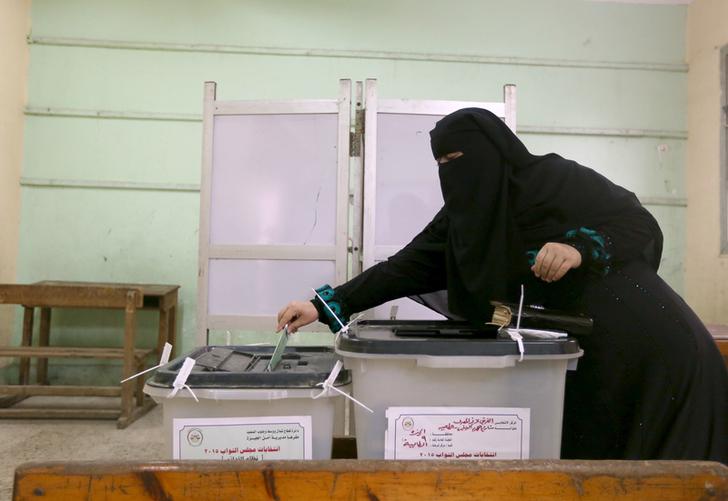Latest NEWS
- Aswat Masriya, the last word
- Roundup of Egypt's press headlines on March 15, 2017
- Roundup of Egypt's press headlines on March 14, 2017
- Former Egyptian President Hosni Mubarak to be released: lawyer
- Roundup of Egypt's press headlines on March 13, 2017
- Egypt's capital set to grow by half a million in 2017
- Egypt's wheat reserves to double with start of harvest -supply min
- Roundup of Egypt's press headlines on March 12, 2017
Egyptian women make gains in parliamentary ballot box

A woman wearing a Niqab casts her vote during parliamentary elections at a polling station in Giza governorate, Egypt, October 19, 2015.REUTERS/Mohamed Abd El Ghany
By Rahma Diaa
Egyptian women won 30 seats in the House of Representatives according to preliminary results of the first phase of parliamentary elections, which saw a turnout of 26.56 percent in 14 provinces including the capital's twin governorate of Giza.
While it was good news that the winning women were all participating on the leading coalition list Fi Hob Misr (For the love of Egypt), the down side was that not a single one of the woman candidates competing over an individual seat made it in the race. Some of them, however, will continue the race in the run-offs, which will take place in 222 out of 226 constituencies, slated for October 26-28 inside Egypt and abroad.
Journalist Nashwa al-Deeb is one of the most prominent candidates to get a second chance, where the Nasserist Party-backed candidate will be competing in Imbaba, one of Giza's largest constituencies. Toping the list with over 22,000 votes, al-Deeb raked 32.6 percent of the votes and will be facing off with two other women and five men over four seats.
Shadia Mahmoud is one of al-Deeb's strongest rivals, coming in third with 18,000 votes, just over 27 percent of the total.
Nermin Ahmed Badrawy will be re-running against three other candidates, all men, after recieving 8,737 (11.76 percent) votes in Giza's Hawamdia constituency, where she came fourth in the race for two seats.
Asmaa Abdel Hakim, a candidate in Giza's Omrania constituency, raked in over 10,000 votes (24.3 percent), coming third on a list of three male competitors hoping to snatch one of two seats in the run-offs, while Maha al-Kashef in Giza's Badrashin constituency, at fourth place with 11,309 votes (20.97 percent) will be contesting run-offs against three other male candidates.
Lawyer Intisar al-Saeed said that while the outcome is satisfactory so far, it is still not representative of women in Egyptian society.
Al-Saeed expects women to hold at least 10 percent of the parliament seats, explaining that "throughout the history of women in the parliament, women only got 10 percent when a quota system was applied, otherwise, the representation of women was always low."
The quota system was applied for the first time in 1979, allocating a minimum of 30 seats for women through the elections law. On that year, women got 35 seats, representing eight percent of parliament at the time.
When the women's quota was reapplied in the 2010 People's Assembly elections, women won 12 percent, which ammounted to 64 seats.
"Egyptian society has been changing slowly but surely since the January 25 uprising. Voters are now convinced to a certain extent that women's presence in parliament is important," said Al-Saeed, adding that the platforms of women candidates were powerful, in addition to their direct contact with their constituents, which gives them an edge over "vote-buying".
Ahmed Abul Magd, executive director of Haqanna, a development and human rights NGO, said that women's progress witnessed in the 2015 parliamentary elections can also be attributed to the lack of strong competition from religious movements.
"The decline of religious movements has contributed to the presence of many women candidates in the run-offs," said Abul Magd.
He pointed out that awareness campaigns and media support for women were reflected in the choice of voters whose women candidates successfully persuaded them despite the challenge of vote-buying in Egypt's difficult economic times.










